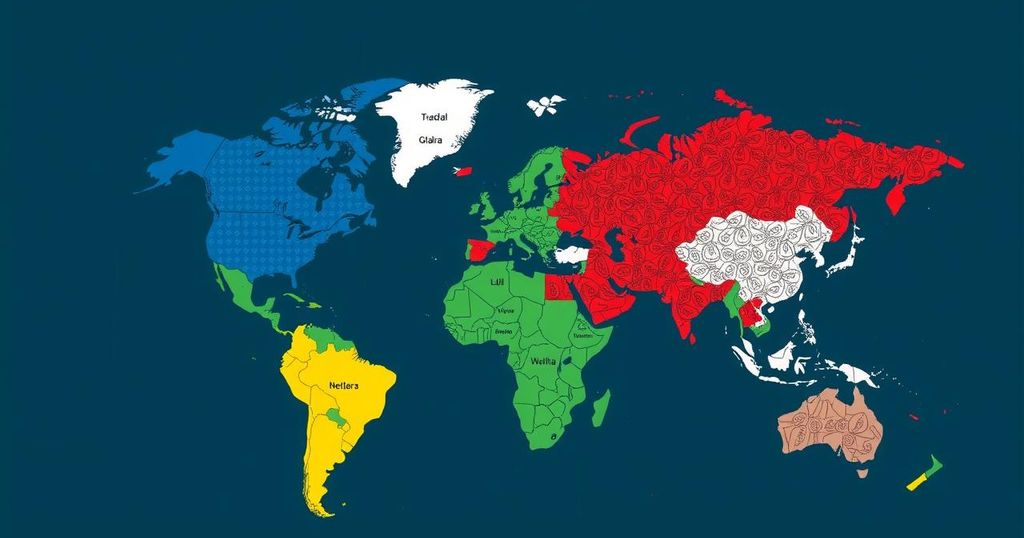Commonwealth Nations Address Climate Change and Slavery Reparations at CHOGM
The Commonwealth Heads of Government Meeting in Samoa focuses on two main issues: the impacts of climate change on small island nations and the discussion of reparations for the historical injustices of transatlantic slavery. Key figures, including King Charles III and various foreign ministers, are addressing the urgent need for climate action while engaging in dialogue regarding the legacy of colonialism and its economic implications.
The Commonwealth Heads of Government Meeting (CHOGM) is currently underway in Samoa, where leaders are engaging in discussions centered on the pressing issues of climate change and slavery reparations. Attended by representatives from 56 nations linked to the former British Empire, this remarkable gathering aims to address significant concerns affecting member states, particularly those that are low-lying island nations vulnerable to the escalating consequences of climate change. UN Secretary-General Antonio Guterres has raised alarms regarding the rapid rise in ocean temperatures affecting Pacific Islands, which are experiencing changes at a rate three times higher than the global average. According to Australian Foreign Minister Penny Wong, climate change constitutes an existential threat to national security and economic stability throughout the Pacific region. Additionally, representatives from various African nations, including Zambia, underscored the rising challenges of climate change on food security and overall ecosystem stability during conversations at CHOGM. Throughout the summit, King Charles III is set to witness firsthand the devastating effects of sea-level rise, as he tours impacted areas. It is anticipated that island leaders will announce a declaration aimed at ocean protection, positioning climate change at the forefront of their agenda. The question of reparations for Britain’s role in the historic transatlantic slave trade also remains a vital topic of discussion. Although British Prime Minister Kier Starmer stated that the UK would not formally address reparations during CHOGM, he indicated an openness to engage with leaders wishing to explore this pivotal issue. The Caribbean Community (CARICOM) has been actively advocating for reparations from former colonial powers, including the UK, France, and Portugal, reflecting a broader international movement toward addressing historical injustices. While detractors argue against holding present-day nations liable for historical wrongdoings, proponents assert that the legacies of slavery contribute to enduring racial inequalities. A source from CARICOM remarked that CHOGM serves as a crucial platform for dialogue on this matter, emphasizing the importance of institutional willingness to engage with those advocating for reparations. As history recounts, from the 15th to the 19th century, over 12.5 million Africans were forcibly taken and sold into slavery by European traders, with many suffering grievous conditions while working on plantations in the Americas. Such historical atrocities continue to resonate and shape contemporary discussions on equality and justice.
The Commonwealth group of nations, composed of countries largely stemming from the former British Empire, convenes periodically to address topics of mutual interest, particularly those that pertain to shared historical circumstances and contemporary challenges. The current meeting in Samoa exemplifies this ongoing dialogue, concentrating on two critical issues: climate change, which poses a significant threat to many member states, particularly small island nations, and the contentious issue of reparations for transatlantic slavery, which remains a poignant and unresolved matter in global discourse. The ramifications of past injustices resonate through questions of racial equity and economic fairness in today’s society, prompting discussions on accountability and reparative justice.
In summary, the Commonwealth Heads of Government Meeting in Samoa is a critical juncture for discussing acute issues affecting member states, notably the existential threat posed by climate change and the contentious debate surrounding reparations for the transatlantic slave trade. As leaders navigate these complex topics, the summit serves as a vital forum for engaging in meaningful dialogue, reflecting a shared responsibility to address both historical legacies and future challenges facing the Commonwealth community.
Original Source: www.swissinfo.ch




Post Comment